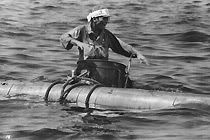
I recently finshed reading Isolde Standish's Myth and Masculinity in the Japanese Cinema (available for a large sum of money at amazon.com), and I gained quite a bit from it. It went after three main periods and types of filmmaking in Japan during the 20th century: the Kokutai within chushingura movies, films about the Special Attack Forces (AKA Kamikaze Pilots) and War Crimes Trials during WWII and the postwar era, and yakuza films of the modern era (after 1970). She draws her critique of the films not from an auteurist point of view, but rather sociological, often citing such social philosophers as Roland Barthes, Joseph Campbell, and Claude Levi-Strauss. Her grasp of their work, and others, helps you not only understand the films in question, but a little more about the world in general through this mutual interest in Japanese film.
Some of the highlights include a few scenes of dialogue and reappraisal of the seemingly forgotten Okamoto Kihachi gem Nikudan (AKA The Human Bullet, 1968.) This ATG film made by one of Japan's more well known 60s directors is hilarious, stylish, and universal in theme even if it's about something so specifically "Japanese" as the hypocrisy within the Special Attack Forces (pictured above Terada Minori as the nameless and illfated protagonist). She also explicates wonderfully the 1995 version of I Want to be a Shellfish (which sent me on a chase to find the 1959 Hashimoto Shinobu directed version, to no avail.) Her reading of Kobayashi Masaki's Human Condition Trilogy will hopefully find it's way into the extra material accompanying the upcoming Criterion Collection DVD of the film (not yet announced, but in the works), as I found it extremely useful in understanding the War Crimes metaphor to be found within the trilogy (she also delves into Kobayashi's 1983 documentary about the War Crimes Tribunal.) Inagaki Hiroshi's Wartime era version of The Rickshaw Man (or the Life of Mohumatsu the Untamed) and Fukasaku Kinji's exciting and enjoyable yakuza series Battles Without Honor and Humanity (available on DVD in the US, fortunately) are also eye opening.
I'm a few chapters into her more recent book A New History of Japanese Film: A Century of Narrative Film (amazon.com), and I've already learned a great deal about Shochiku studios "Ofuna" style, and Kido Shiro (whose autobiography would be a prize possession if ever translated into english) and I'm chomping at the bit to read the rest. She's also working on a new book, and in her own words, this is what it's about: "My next project, War on Film, takes as its starting point Paul Virilio's statement 'War is cinema and cinema is war'. A cross-cultural analysis, this study focuses on the relationship between war and cinema as an exploratory paradigm. The aim of the study is to further our understanding of the relationship of changing technological developments in the visual media, and the shaping of individual subjectivity in the image and likeness of the globalized 'military-industrial-media-entertainment-networks' that increasingly influence our lives."
Sounds great to me.
4 comments:
Just finished Standish's "New History" -- a number of interesting points in this -- but she really seems to oversimplify the course of Japanese cinema history. She seems to focus on a relatively few films -- and seems to ignore anything that might contradict (or complicate) her story.
I agree, Michael. But I think a comprehensive history isn't really what she's going for, and the points she makes are valid and interesting. What the book really makes me long for is a series of translations of autobiographies from directors, producers, and actors in Japan. There's so little of this available to non-scholars. Particularly Ozu's and Kido Shiro's memoirs would be amazing to read. I'd really like to see something meatier about early Shochiku studios "ofuna" style.
Also, I have a package coming your way.
Ozu never really did any memoirs -- but did keep a set of notebooks. These used to be available (in French) -- alas, these went out of print before I managed to get them.
I think what is more important than memoirs is the availability of more (and more varied) films. ;~}
Speaking of Ofuna style -- Ersatz Ofuna is very different from the real thing -- just watched "Always". Despite its armload of trophies, pretty unimpressive overall.
I'll look forward to your packet.
More available films is of course important, but it seems like the price involved (rights issues, restoration, transfer) makes the issues surrounding a printed work pale in comparison. Besides, some headway is being made on video availability while none is being made on the writings.
I'll have to get back to you on the Ersatz Ofuna. But studying early Shochiku as a whole seems very interesting to me.
Post a Comment